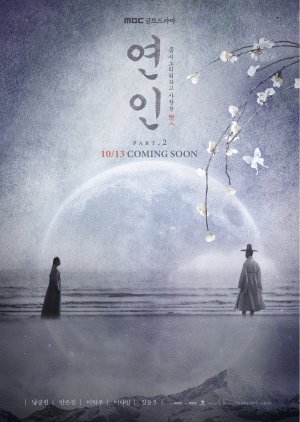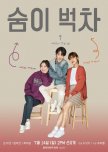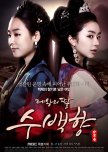MUHTEŞEM OYUNCULUK
1.bölümde diziye şans vermedim ve kapattım sonrasında şans vermem gerektiğini düşünerek döndüm iyi ki dönmüşüm izlediğim en iyi oyunculukları izledim diyebilirim dizi boyunca hiç oyunculuk yaptıklarını düşünmedim sanki karakterlerlerle oyuncular bir bütündü .hikaye yönünden biraz zayıf olduğunu düşünüyorum çin işgalini hikayenin ana konusu gibi ön plana aldıktan sonra koreye ne olduğunu veya işgalin devam edip etmediğini kısa alarak verseydiler daha iyi olurdu ayrıya ryang euma ne oldu? Beyazlamış saçlarıyla ne anlattı? Onu neden deli ilan ettiler ve hala neden demir parmaklıklar içinde ? Lee jang hyeon neden önceki hizmetçinin adını ona verdi sırf sadece şarkı söylediği için mi? Fazlaca soru işareti bıraktı ama izlemeye değerdi öneririm 👍🏻Esta resenha foi útil para você?

When It’s Fate..its Fate
Part 1 of "My Dearest" was undeniably a masterpiece, setting a high standard that Part 2 had to live up to. While I was glad to see the continuation, my expectations were naturally elevated.Throughout the episodes of Part 2, I remained optimistic. Despite any shortcomings in the storyline, witnessing the journey of our main characters, the ML and FL, reminded me to cherish the moments of joy they shared. It's a valuable lesson—to focus on the positives amidst the challenges.
Admittedly, there were moments in the drama that seemed far-fetched, where our leads couldn't catch a break. However, I choose to interpret it as the writer's portrayal of fate prevailing against all odds.
Namkoong Min's exceptional acting, worthy of the Baeksang Award, undoubtedly salvaged some of the shortcomings of Part 2. While some may dismiss this drama as a waste of time, it still had its fair share of heart-fluttering moments and comedic scenes, making it a worthwhile watch in my eyes.
Esta resenha foi útil para você?
My FAV for 2023
Such a great drama. So emotionally captivating. The actors, the story and the chemistry between Jang Hyun and Gil Chael is so hot…... All the casting actually is great.I just can’t wait to watch next episodes....although I wish I could just watch it till the end right now.
Well those two are my favourites, the way they act is so deep …emotional…intelligent…pure and minimal. Even if they say nothing is like they are saying everything….
If they don’t end up together I will be very disappointed :( :( :(
Esta resenha foi útil para você?

Part 1: ASTOUNDING–Part 2: DRIFTED OFF....
Hands down to the emotional rollercoaster throughout the drama, the actors are stupendous. I'm like so doubtful I even saw emotions through my screen due to the splendid performance from ALL SIDES. Each character had their moments, each actor/actress, whether good or bad, all had their moments of splendor and disgust, which is what makes them all SO. MUCH. MORE. REAL. Unpopular opinion, I personally LOVE the Qing Princess character for being the most complex and well misunderstood/understood character. Her character has the equivalent complexity as the male lead which I find is a great accomplishment to the storyline. I wish script writer would add more characters like hers, it just makes a cliche storyline so much more intriguing and with more plot twists––better yet make a character like her the main character, aka strong FL (omg I would so watch that!).However, I have to say, with the extremely high expectations from Part 1, Part 2 definitely drifted off. Although not as believable, was still enjoyable to watch. There were points there I find were a bit incredulous, and some things didn't quite make sense or they didn't quite round it off, especially with the character Ryang Eum, but overall the performance of each character was what ultimately made this drama an enjoyable ride.
Esta resenha foi útil para você?

Dramma bellissimo una storia d'amore struggente in tempi davvero difficili e violenti
Carissimo" è davvero un dramma bellissimo. Nonostante le immagini crude nei momenti difficili, il racconto è di un'intensità struggente. La storia d'amore tra i protagonisti, pur iniziando quasi per gioco, si trasforma gradualmente in un legame profondo e incrollabile, capace di sfidare le numerose prove che la guerra e la società impongono loro.Al cuore della narrazione non c'è solo l'amore romantico, ma anche un affascinante legame fraterno tra i due protagonisti maschili, che cresce tra momenti di conflitto e solidarietà. Il loro rapporto diventa un faro di lealtà e rispetto reciproco, che si rafforza mentre lottano per i propri valori e per il benessere delle persone amate. Entrambi si trovano immersi in una realtà più grande di loro, ma la loro determinazione a proteggere chi ama li porta a una crescita personale che è sia dolorosa sia profonda
"Carissimo" offre un ritratto unico di un'epoca storica, in cui idealismo e sacrificio vanno di pari passo, e ci ricorda quanto possono essere complessi i legami umani, specialmente in tempi di crisi. È una storia che tocca l'anima, mostrando come amore, amicizia e onore possano intrecciarsi in modi inaspettati, rendendo ogni momento di questo dramma una lezione di vita e coraggio.*
La storia si svolge durante il periodo Joseon nel 17° secolo segnato dalla Seconda Invasione Manciù della Corea nel 1636. Quando la guerra inizia a travolgere il paese, entrambi i protagonisti si ritrovano a dover mettere da parte le loro idee romantiche e le certezze del passato per confrontarsi con le dure realtà della sopravvivenza.
In mezzo a battaglie, fughe e devastazioni, Gil-chae e Jang-hyun sviluppano un legame profondo che li porterà a crescere e a cambiare. Gil-chae, inizialmente inesperta e ingenua, matura affrontando le difficoltà, scoprendo il coraggio e la forza necessari per proteggere coloro che ama. Allo stesso tempo, Jang-hyun, che ha sempre vissuto con distacco e cinismo, si lascia lentamente trasformare dal calore e dalla dedizione di Gil-chae, trovando in lei un motivo per aprirsi e per affrontare le sue sofferenze passate.
La loro storia d'amore è però continuamente messa alla prova dalla guerra, dalle convenzioni sociali e dai segreti che entrambi si portano dietro. Tra separazioni dolorose, incontri imprevisti e ostacoli quasi insormontabili, i due si trovano a combattere non solo per sopravvivere ma anche per proteggere il loro amore.
il drama esplora il potere trasformativo dell'amore e della resilienza in tempi di crisi, mettendo in evidenza le lotte interiori e sociali che accompagnano sia l'amore sia l' identità. La serie riflette sul sacrificio, sulla ricerca della propria voce in una società rigida e sull'importanza di rimanere fedeli a sé stessi anche quando il mondo intorno è in rovina.
La storia d'amore tra Gil-chae e Jang-hyun è al centro del drama, ma non è solo una storia romantica idealizzata. È un amore che richiede sacrificio, che mette entrambi i protagonisti davanti alle loro paure e li spinge a crescere, abbandonando pregiudizi e illusioni infantili. La loro relazione è una critica ai sentimenti superficiali e idealizzati, invitando a riflettere sul fatto che l'amore autentico nasce dalle difficoltà e dalla reciproca trasformazione
La parte storica di *Dearest* è stata ricostruita con grande attenzione, e il dramma cerca di mantenere una certa fedeltà al contesto dell'invasione della dinastia Qing, che avvenne durante il periodo Joseon nel 17° secolo. Questo periodo fu segnato dalla Seconda Invasione Manciù della Corea nel 1636, un evento traumatico che ebbe un impatto devastante sulla popolazione e sulla politica del tempo. Ecco alcuni aspetti storici che il dramma cerca di rappresentare in modo accurato: La dinastia Qing, originaria della Manciuria, era una minaccia concreta per Joseon, e durante l'invasione, molti nobili e civili furono presi in ostaggio o uccisi. La popolazione coreana fu costretta a piegarsi al dominio Qing per garantire la sopravvivenza del paese. Il dramma rappresenta bene le tensioni e l'angoscia vissuta dalla popolazione e dall'aristocrazia coreana, così come il senso di onore e vergogna che accompagnava questo conflitto.
Nel periodo Joseon, la cultura confuciana e il codice d'onore attribuivano grande importanza alla purezza e alla castità delle donne, soprattutto per quelle di origine nobile. Secondo la mentalità dell'epoca, una donna era considerata "disonorata" anche solo se veniva sfiorata contro la sua volontà o subiva violenze, in particolare da parte di un nemico o di un invasore. Questo era dovuto a una visione molto rigida e patriarcale della moralità e della purezza femminile, che si rifletteva in un'idea di "onore familiare" basata sulla reputazione della donna.
Durante le invasioni, molte donne di famiglie nobili preferivano il suicidio piuttosto che rischiare di essere catturate, poiché pensavano che la loro "perdita di purezza" avrebbe gettato disonore non solo su di loro, ma anche su tutta la loro famiglia. Una donna che fosse stata anche solo sfiorata dall'invasore infatti poteva essere rifiutata dalla sua famiglia e dalla società, anche se ciò fosse avvenuto senza il suo consenso. Questo stigmatizzava ancora di più le vittime, contribuendo a una cultura di colpa e vergogna in cui le donne erano tenute a uno standard moralistico ingiusto
Nel periodo Joseon gli studenti avevano un ruolo molto importante e rispettato nella società, soprattutto quelli che studiavano per diventare funzionari governativi. Durante questa dinastia, la cultura confuciana promossa dal governo coreano enfatizzava il valore dell'istruzione e l'importanza dello studio dei classici confuciani per raggiungere posizioni di potere e rispettabilità. Gli studenti, in particolare quelli delle *seowon* (accademie confuciane) o delle *hyanggyo* (scuole locali confuciane sponsorizzate dal governo), erano considerati i futuri leader intellettuali e morali del paese.
Uno dei motivi per cui gli studenti godevano di uno status elevato era il Sistema degli Esami Gwageo
Per avanzare nella gerarchia politica, si dovevano superare gli esami *gwageo*, un sistema di esami imperiali basato sul modello cinese, che richiedeva uno studio approfondito delle opere confuciane, della poesia e della filosofia. Gli studenti che eccellevano in questi studi avevano la possibilità di entrare nella burocrazia di Joseon, diventando ufficiali e funzionari rispettati. Questa possibilità rendeva l'istruzione altamente ambita, e gli studenti godevano di grande stima sociale per il loro impegno
In Dearest, la rigidità e l'idealismo degli studenti, insieme all'ostinazione del re, portano a sacrifici enormi e spesso inutili, che pesano soprattutto sulla popolazione comune. La loro intransigenza, sebbene fondata su principi elevati e sull'orgoglio nazionale, finisce per rivelarsi un'arma a doppio taglio, con conseguenze devastanti per il popolo. L'idealismo degli studenti, spinto dal desiderio di mantenere l'onore e di resistere all'invasione, porta a decisioni che , purtroppo, ignorano il costo umano e le condizioni reali. Gli studenti idealisti, pur con buone intenzioni, mancano a volte della flessibilità necessaria per adattarsi alla realtà della guerra. Il loro atteggiamento rigido, dalle lontano esigenze pratiche, finisce per chiedere sacrificio alla popolazione, che subisce direttamente il peso della guerra, della carestia e della perdita di libertà
Il suicidio di molte donne, presentato nel dramma, riflette la devastazione che una società confuciana estremamente patriarcale poteva infliggere. In tempi di invasione e di disonore, queste donne non avevano via di fuga: pur essendo vittime, erano condannate a portare il peso di un'umiliazione che la società non perdonava. Questo codice morale così duro costringeva molte di loro a scegliere la morte piuttosto che vivere in un mondo che le avrebbe rifiutate e condannate ingiustamente.
Il dramma, nel mostrare queste storie, offre una critica potente alla rigidità di una morale che, pur basata su principi di purezza e onore, finisce per trasformarsi in un sistema che punisce proprio i più vulnerabili. La rappresentazione del dramma e del suicidio di queste donne costrette a scegliere tra l'onore e la vita fa riflettere su quanto possa essere disumanizzante una società che antepone il codice morale alla compassione e alla giustizia.
Dearest lascia, quindi, un messaggio struggente: non basta combattere il nemico esterno se si ignorano le battaglie interne e le sofferenze imposte dai propri valori. È un invito a costruire una società dove l'onore non sia una prigione, ma un valore che protegge e rispetta ogni vita, senza eccezioni.
Esta resenha foi útil para você?
Esta resenha pode conter spoilers
twists, angst,separation,bravery,and somewhat happy conclusion
I am glad that the main couple got a happy end but I felt really bad for Ryan eum, its sad how they left him in that cell still wondering what happened to lee jang hyun.it was so unfair to leave him there without closure.Also I would not have minded if nam yeon committed sucide, he ended becoming such a useless and irritating character, Gil Chae should be grateful he never chose her.
I do think she has poor taste in men because both nam neon and that her ex-husband were such sorry excuse for men. That's why I felt it was stupid choice to choose him over LJH, it didn't come as a shock to see that he abandoned her when she needed him most he always saw as a beautiful possession and not an actual human being.
I felt sad for the crown prince and crown princess and how they met such a terrible end without even getting justice, worse her son didn't even inherit the throne and the evil concubine just got away with everything's terrible.
I didn't like the unnecessary double amnesia plot and to me it didn't add anything relevant to the storyline.
Also I loved the acting of nam koong min, His ability to make his eyes and face convey so much emotions without even uttering any words was so brilliant.
I felt like part 1 was much stronger than part 2 but overall this was interesting, heartbreaking ,emotional and beautiful story to watch and It was totally worth the journey.
Esta resenha foi útil para você?

"My Dearest" is one of the best period k-drama. From Cinematography, story, set up, locations, customs, action, actors and of course the main leads. It is a roller coaster of emotion from episode 1 to episode 21.
I love the character development of the female and male lead. Their love story is a series of love, longing, pain, suffering and dedication. It breaks you and heal you then break you again and heal you over and over again. Lee Jang-hyun unwavering love to Gil-chae is one of the highlight of the story. As a women you will eventually realize you want to experience that kind of love in this lifetime.
You will feel so much emotions in every scene. It was perfectly written and beautifully acted.
Namkoong Min performance as Lee Jang-hyun is exceptional. His smile, his action, his facial expression, his longing face. They deserve all the awards!
Esta resenha foi útil para você?

A review of both part 1 and 2
What both stunned and impressed me the most about the kdrama My Dearest, right at the very start, was how focused it was on the ordinary people and how they deal with war. And what the war does to them. It makes it less of a war epic and more of a human tale of self-preservation and hope at a trying time. which I found to be quite a fresh approach to this kind of historical drama, although many will no doubt find it rather slow and dry in its execution and style.The story is ruthless in its realism and harshness with how it seems to paint the world. The narrative is very willing to comment on several aspects within society that it tells it’s tale, the nobility and their uselessness, the lack of care that a certain position within society seems to push into you for the people that live around them, as well as society’s attitude towards women in wartimes and just their position in society both outside of that as well. The way it uses these elements to shape itself, the details it shares throughout the story is very tangible, interesting but also poignant. It is incredibly well thought out and effective within the narrative to stir up further emotions both with the characters and the viewers.
These are not the heroes that poems are sung about, but seem to be more everyday heroes of the common folk. Most of their influence is not great within the grand scheme of things, but it is the people who knew them who will always remember them with kindness and love. They are the ones who will tell the stories about them until they disappear from human memory and are forgotten.
At some point, despite their intelligence and strength, as the war and the hardships seem to tighten more and more around them, the characters seem to wear down a bit. But they never lose who they are, their will to fight but how they go about fighting, how they deal with situations changes a little. All that happens very slowly and works very realistically within the story. It’s a really well-handled look at character, as well as how normal people deal with such situations.
The characters do feel sharp and manage to be both a fresh take on the traditional characters that we get in a Korean historical dramas, but at the same time they have quite a bit of the characteristics that we are used to seeing; Jang-hyun may come across as smug and aloof, and Gil-chae may come across as snobbish and somewhat self-interested. But there’s a lot more to them and their flaws are very presant within the story. Overall there are plenty of multi-layered characters that make My Dearest a rather worthwhile and heart-wrenching watch. Everyone has something to say in their own way and all have some point to emphasize within the story. The story touches your heart from beginning to end if people just allow themselves to enter this cruel, realistic world with these characters as a guiding light.
The plot itself goes through its ups and downs, and it does hit a bit of a lull within the second half where the story tends to repeat itself quite often. Characters almost miss each other a few times over the course of few episodes in order to create tension and longing within the viewers, and since the story is already slow by nature it might make some people really struggle. It makes it seem like the story has lost steam and doesn’t really pick up fully until right near the end. But if the characters manage to grab you and make you completely fall for them in the first half of the story, it’s perfectly tolerable.
The story never seems to fall into being too epic or too grandiose in its approach to the narrative, as some costume dramas tend to do to make their heroes seem bigger. Much rather My Dearest seems so focused on being realistic and grounded in reality like it has a bit of an obsession with the human spirit and the lengths to which people will go to survive. It run through the very heart of the series. And the love story, which is really successful on its own, reflects that. It’s very slow and down to earth and it’s quite unusual for a kdrama in lots of ways.
The story takes its time, sometimes excessively so, and repeats itself a bit too often, but even if it takes the story a good while it manages to underline every point that the drama set out to make really well. The story always seemed to know what it wanted to say. And the humanity that this series carries with it and manages to reflect within the narrative does make you cry many times. It’s gorgeous, it’s heartwarming and filled with hope for brighter days that is always enveloped by a little bit of sadness.
Esta resenha foi útil para você?

The Chemistry between the leads is the best thing in the show
I will try keeping it Simple and Short :Watched this show since the first episode of Part 1 dropped and good lord there wasn't a slight moment where i regretted it.
After P1 ended with a huge heartbreak, and P2's date was announced, damn I felt like ML from the show feeling the pain of waiting for P2 to drop.
As for the show you feel all the emotions, happiness, sadness, anger, pain, hatred, thrill, suspense, butterflies, heartbreaks. You will laugh and cry for the characters especially the main leads.
Both the main actors nailed their roles, each and every emotion was shown so beautifully. The story, acting and production value was top notch.
The show is a slowburn and filled with moments of heartbreaks and separations. Till the end you don't know whether there will be a happy or a tragic ending. So if you can handle that then this is the show for you.
(The show and cast deserve all the awards they are getting)
Esta resenha foi útil para você?

Lost steam from Part 1, but still a worthy watch
After a heart-breaking finish to Season 1, the story turns once again to the Qing invasion and the atrocities committed in the aftermath on a chaotic, fractured, and helpless Joseon. Only the efforts of officials and people on the ground like Jang Hyun, working with the hostage Crown Prince, are tenuously holding the country together. Despite the horrific suffering of Joseon prisoners of war, Gil Chae manages to rebuild some of the comfortable lifestyle she was accustomed to but is shockingly reminded that class is meaningless in an oppressed state. There are also stark reminders of how women are truly expendible victims. I was waiting to see what choices the characters made when pushed to extremes and this season had some of the most riveting scenes. The tone was lightened at times with romantic tropes (pretending to be sick to get attention) which seemed out of place in a drama of this caliber.At around Ep15 I suddenly remembered the opening scene of Ep1 which takes place more than 20 years after the 1637 invasion. It was worth a re-watch to find hints at a very tragic conclusion for our heroes. The announcement of an extension came after Ep8 aired and I wondered if there would be a hopeful epilogue. Unfortuately, after Ep20 the Ep1 opening sequence was not yet reached in the story and I was left wondering if the extension had already been inserted. There was no added value to Eps 19&20 and they could easily have been combined into one. Ep1 is recapped in the finale, Ep21.
At times throughout the drama I kept feeling a disconnect between Gil Chae and Jang Hyun's relationship and their surroundings, like I was watching 2 separate shows. Political events deeply affected each of them separately and this was infused into how they dealt with each other during Part 1. However, that influence seemed less evident in Part 2 even though the political pressures never went away. They lived and worked separately for so long that there wasn't much that they actually did for/with each other. It was as if Eps19/20 were there just to make up for their separation, more couple less story, and I felt the show lost momentum at this point as all the other characters got moved to the sidelines. However, the finale felt right once more as loose ends got tied up.
All in all, the acting was among the strongest I've seen in any show (I still think The Red Sleeve's demented king was an acting masterclass). Although Part 2 seemed to run out of steam in the 2nd half, the strong production, story telling, and deep dives into the human psyche makes this show worth watching.
Esta resenha foi útil para você?

Uno dei più bei drama storici d'amore mai visto prima!
Inizialmente stavo quasi per lasciare il drama, non mi convinceva, lei troppo frivola e smorfiosa e la storia poco convincente, ma grazie ai tanti commenti letti entusiasti di chi lo aveva visto in precedenza, ho deciso di andare avanti e ho fatto benissimo.Un drama eccellente, una bella storia articolata ed avvincente, che fino all'ultimo fa rimanere col fiato sospeso.
Questo drama storico, basato su eventi realmente accaduti, è intessuto di una delle più belle storie d'amore mai viste .
L'attore principale spicca su tutti, è di una bravura che lascia senza parole, decisamente meglio di chiunque altro sebbene tutti in genere, siano stati all'altezza della loro parte. Ma Nam Goong Min, è inarrivabile. La sua mimica, la gestualità, il portamento lascia senza fiato.
Nel racconto non ci sono buchi che lasciano interdetti e che a volte bisogna supplire con la fantasia, è tutto ben raccontato.
Un fiore all'occhiello del drama sono le musiche strumentali che accompagnano ,senza essere invadenti, ogni singolo momento con pathos.. stupende! Sono un valore aggiunto.
Un drama da vedere più volte, di cui gustare la recitazione di ogni attore ed attrice, e soprattutto godersi l'attore maschile protagonista, davvero eccezionale!
Grazie come sempre al cast dei traduttori in italiano, senza di loro come potremmo goderci queste perle?
Esta resenha foi útil para você?
Esta resenha pode conter spoilers
While retaining the poetic beauty of the original, this second half is a painful epilogue . . . At this point, I'm convinced the writers are sadists, and I can't stand to watch anymore just to see it all come to a bad end one last time. In sum, the random twists and turns that started cropping up in the last episodes of the first season, multiply in the second half. Hurdle, after hurdle, after hurdle. Just nonsensically raising hopes and dashing them. Will there be scenes that stick with me? Yes. Did I vow to stop watch multiple times? Also yes.
The acting, production values, cinematography, and some key pieces of dialogue are excellent. There are some powerful scenes that will linger on - but we're talking all of 10-15 minutes in 8 hrs of viewing. The key theme of the show is to always persist and survive as there could be the best moments of your life just around the corner.
I feel vaguely guilty, therefore, of not persisting to the end of this one, but frustration and dread was growing with every episode, and life is too short. I ended it at a high point, and I don't have strength to see if things fall apart once again. I would still highly recommend watching the first half/season 1 - it stands on its own and is a true gem of a K -Drama.
Esta resenha foi útil para você?






































